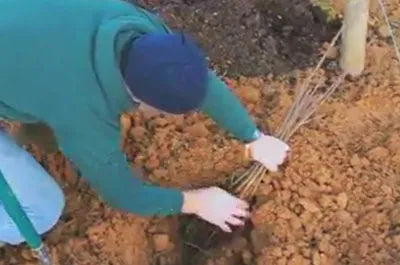
Growing Fruit Trees at High Altitude
16/10/2025
We get lots of enquiries about growing fruit trees in the UK at altitude, often from people who have seen the magnificent Sepp Holzer farm at over 3600ft in Austria.
We would love to sell as many orchards as we can, but for most gardeners in the UK, it will be very difficult to copy high altitude growers like Herr Holzer.
Austria is far further South than the UK, and the continental growing season there is much longer and hotter.
People are surprised to hear us say:
"Unfortunately, your high altitude, windswept location sounds beautiful, but terrible for fruit trees in the UK.
South facing gets sun, but those harsh prevailing winds are mainly south-westerly.
North facing will limit your best options down to sour fruit like Morello Cherries and Damsons, maybe some cooking or cider apples."
Because we do a good impression of being nice, friendly people, we try to explain why this is a problem:
"Air temperatures are lower in Spring & Autumn, so fruit trees flower later and have less time to ripen: this has a worse effect on large and/or sweet fruit than it does on small and/or sour fruit, but it's never good.
Strong wind is a problem for pollinating insects, which require a lot of shelter to move around your garden and actually stay in the fruit trees!"
With all that being said, we know of a successful fruit grower at 880 feet in Snowdonia, where the relatively warm Welsh weather and her South facing location help a lot:
"Fruit is possible at higher altitudes and in extreme conditions.
I’m 268m up in Snowdonia, very exposed but sunlight from East to West all day, and I get good annual harvests from my Morello, all my gooseberries and whitecurrants, prolific fruiting from my blackcurrants, autumn raspberries. Strawberries are a wash-out.
This year I got maybe 40 fruit from my four-year-old Ashmead’s Kernel.
Sarah Fernley, Snowdonia, Wales
There are old wild plums (maybe Welsh varieties) 30 metres higher up which crop well in the full blast of North easterlies and there are other old cottages which grow these in abundance at much higher altitudes, albeit with some shelter from the cottages.
So far, the only thing I have had to cage is the Morello from the tits."
So while it is possible in ideal locations like Sarah's, we still say that above 900 feet, most people in the UK should not bother with fruit trees unless you have an unusually ideal, sheltered South facing site without late Spring frosts: good luck!
Even most soft fruit will struggle, but you can try lingonberries, Vaccinium vitis-idaea, and billberries, V. myrtillus.
Above 900 feet in the wild, you will mostly find only Montane Scrub habitats of stunted, super hardy trees and shrubs.
Still want to try growing fruit up a mountain here on this Great British Isle? Good.
Which Fruit Plants are Best to Grow up A Mountain?
- Soft fruit bushes have later flowering times and ripen in a shorter growing season than trees. They are closer to the ground, catching less wind. You can grow them in rows between fruit trees to help connect them for bees.
- Gooseberries, currants, blackberries, and raspberries are all good, most strawberries won't do so well unless they are small alpine strawberries.
- The best fruit trees for high altitude are the least sweet, and have later flowering times, such as this list of apple trees for the North & Scotland.
Elderberry and Edulis rowans are troopers as well. - Self-fertile fruit trees still need insects to pollinate them, but can be pollinated by a wider range of bugs, including beetles that don't fly much, because they don't need to get from tree to tree.
- Grow some fruit trees as cordons, espaliers, or fans against a sheltered South facing wall, where they will be warmer and ripen faster.
Top Tips for Growing Fruit at High Elevation
-
Plant on slopes: Cold air is heavy and falls. It runs down slopes and comes to rest in valley bottoms, hollows, and dips, so those places are where you get the worst late frosts.
If your fruit tree flowers get badly frosted, you won't get fruit that year.
When fractions of a degree are the difference between crop life and death, planting on a slope can make all the difference. -
Protect your crops from wind: A major drawback of slopes is they tend to be really windy. Strong winds make it hard for pollinating insects to do their job.
Windbreak trees and hedges around and through your garden are essential, so plant them without delay if you are planning an orchard!
Using your house as a shield from the prevailing wind and to create a relatively frost free microclimate.
North facing slopes tend to be less windy in Spring (your mileage may vary!) when your trees are flowering, so may need less protection than a sunny South facing slope. - Support bees and other insects: Planting things specifically for the local insects is always a good idea, but it's essential for orchards high up. Bee friendly hedges are a two-for-one windbreak and bee fodder, but plenty of wild native spring bulbs and herbaceous perennials are necessary to maintain the nectar supply. Leave debris piles in out-of-the-way places, make a pond, and leave some corners of your garden to grow wild with brambles and nettles.
- Soil drainage: Mountainous regions are typically prone to dry soil in Summer, so yearly mulching is key, but even so you should be prepared to irrigate in the growing season. Getting your hands on large amounts of mulch can be tricky, so be resourceful and make friends with your local tree surgeons to get their woodchips!










 Secure, One-Tap Checkout
Secure, One-Tap Checkout
 Hand Picked, Delivered to Your Door!
Hand Picked, Delivered to Your Door! 1 Year Bareroot Guarantee
1 Year Bareroot Guarantee


